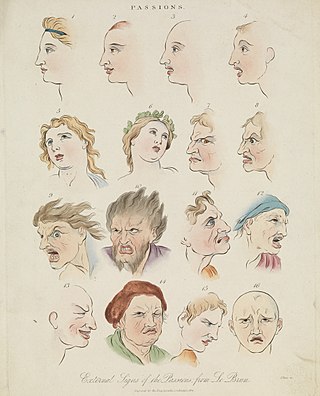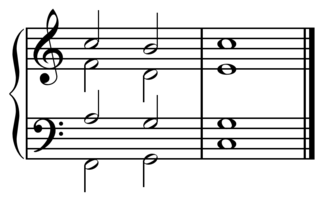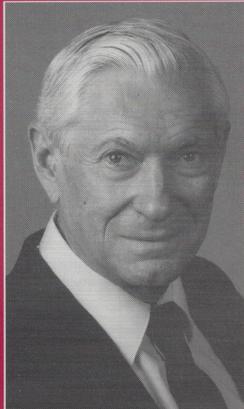
Anxiety is an emotion which is characterized by an unpleasant state of inner turmoil and includes feelings of dread over anticipated events. Anxiety is different from fear in that fear is defined as the emotional response to a real threat, whereas anxiety is the anticipation of a future threat. It is often accompanied by nervous behavior such as pacing back and forth, somatic complaints, and rumination.

Emotions are mental states brought on by neurophysiological changes, variously associated with thoughts, feelings, behavioral responses, and a degree of pleasure or displeasure. There is no scientific consensus on a definition. Emotions are often intertwined with mood, temperament, personality, disposition, or creativity.
Personality psychology is a branch of psychology that examines personality and its variation among individuals. It aims to show how people are individually different due to psychological forces. Its areas of focus include:

Hope is an optimistic state of mind that is based on an expectation of positive outcomes with respect to events and circumstances in one's life or the world at large. As a verb, its definitions include: "expect with confidence" and "to cherish a desire with anticipation".
Psychology is an academic and applied discipline involving the scientific study of human mental functions and behavior. Occasionally, in addition or opposition to employing the scientific method, it also relies on symbolic interpretation and critical analysis, although these traditions have tended to be less pronounced than in other social sciences, such as sociology. Psychologists study phenomena such as perception, cognition, emotion, personality, behavior, and interpersonal relationships. Some, especially depth psychologists, also study the unconscious mind.

Sadness is an emotional pain associated with, or characterized by, feelings of disadvantage, loss, despair, grief, helplessness, disappointment and sorrow. An individual experiencing sadness may become quiet or lethargic, and withdraw themselves from others. An example of severe sadness is depression, a mood which can be brought on by major depressive disorder or persistent depressive disorder. Crying can be an indication of sadness.

In the case of uncertainty, expectation is what is considered the most likely to happen. An expectation, which is a belief that is centered on the future, may or may not be realistic. A less advantageous result gives rise to the emotion of disappointment. If something happens that is not at all expected, it is a surprise. An expectation about the behavior or performance of another person, expressed to that person, may have the nature of a strong request, or an order; this kind of expectation is called a social norm. The degree to which something is expected to be true can be expressed using fuzzy logic. Anticipation is the emotion corresponding to expectation.

Tonality is the arrangement of pitches and/or chords of a musical work in a hierarchy of perceived relations, stabilities, attractions, and directionality. In this hierarchy the single pitch or triad with the greatest stability is called the tonic. The root of the tonic triad forms the name given to the key, so in the key of C major the tone C can be both the tonic of the scale and the root of the tonic triad. The tonic can be a different tone in the same scale, when the work is said to be in one of the modes of the scale.
In psychoanalytic theory, a defence mechanism is an unconscious psychological operation that functions to protect a person from anxiety-producing thoughts and feelings related to internal conflicts and outer stressors.
Learned helplessness is the behavior exhibited by a subject after enduring repeated aversive stimuli beyond their control. It was initially thought to be caused by the subject's acceptance of their powerlessness, by way of their discontinuing attempts to escape or avoid the aversive stimulus, even when such alternatives are unambiguously presented. Upon exhibiting such behavior, the subject was said to have acquired learned helplessness.

Robert Plutchik was a professor emeritus at the Albert Einstein College of Medicine and adjunct professor at the University of South Florida. He received his Ph.D. from Columbia University and he was also a psychologist. He authored or coauthored more than 260 articles, 45 chapters and eight books and edited seven books. His research interests included the study of emotions, the study of suicide and violence, and the study of the psychotherapy process.
Coping refers to conscious strategies used to reduce unpleasant emotions. Coping strategies can be cognitions or behaviors and can be individual or social. To cope is to deal with and overcome struggles and difficulties in life. It is a way for people to maintain their mental and emotional well-being. Everybody has ways of handling difficult events that occur in life, and that is what it means to cope. Coping can be healthy and productive, or destructive and unhealthy for you or others. It is recommended that an individual cope in ways that will be beneficial and healthy. "Managing your stress well can help you feel better physically and psychologically and it can impact your ability to perform your best."

Curiosity is a quality related to inquisitive thinking such as exploration, investigation, and learning, evident in humans and animals. Curiosity is associated with all aspects of human development, from which derives the process of learning and desire to acquire knowledge and skill.
In music cognition and musical analysis, the study of melodic expectation considers the engagement of the brain's predictive mechanisms in response to music. For example, if the ascending musical partial octave "do-re-mi-fa-sol-la-ti-..." is heard, listeners familiar with Western music will have a strong expectation to hear or provide one more note, "do", to complete the octave.

Oculesics, a subcategory of kinesics, is the study of eye movement, behavior, gaze, and eye-related nonverbal communication. The specific definition varies depending on whether it applies to the fields of medicine or social science.

In music, chromatic mediants are "altered mediant and submediant chords." A chromatic mediant relationship defined conservatively is a relationship between two sections and/or chords whose roots are related by a major third or minor third, and contain one common tone. For example, in the key of C major the diatonic mediant and submediant are E minor and A minor respectively. Their parallel majors are E major and A major. The mediants of the parallel minor of C major are E♭ major and A♭ major. Thus, by this conservative definition, C major has four chromatic mediants: E major, A major, E♭ major, and A♭ major.
Carroll Ellis Izard was an American research psychologist known for his contributions to differential emotions theory (DET), and the Maximally Discriminative Affect Coding System (MAX) on which he worked with Paul Ekman. Izard also undertook empirical studies into the facial feedback hypothesis according to which emotions which have different functions also cause facial expressions which in turn provide us with cues about what emotion a person is feeling. In addition, Izard constructed a multidimensional self-report measure – the Differential Emotions Scale – currently in its 4th edition (DES-IV). His later research focused on emotional development in young children and the development and testing of his Emotions Course for Young Children.

Emotion classification, the means by which one may distinguish or contrast one emotion from another, is a contested issue in emotion research and in affective science. Researchers have approached the classification of emotions from one of two fundamental viewpoints:
- that emotions are discrete and fundamentally different constructs
- that emotions can be characterized on a dimensional basis in groupings

Research into music and emotion seeks to understand the psychological relationship between human affect and music. The field, a branch of music psychology, covers numerous areas of study, including the nature of emotional reactions to music, how characteristics of the listener may determine which emotions are felt, and which components of a musical composition or performance may elicit certain reactions.
Compassion fade is the tendency to experience a decrease in empathy as the number of people in need of aid increase. As a type of cognitive bias, it has a significant effect on the prosocial behaviour from which helping behaviour generates. The term was developed by psychologist and researcher Paul Slovic.













